Disclosure: I was sent books to review.
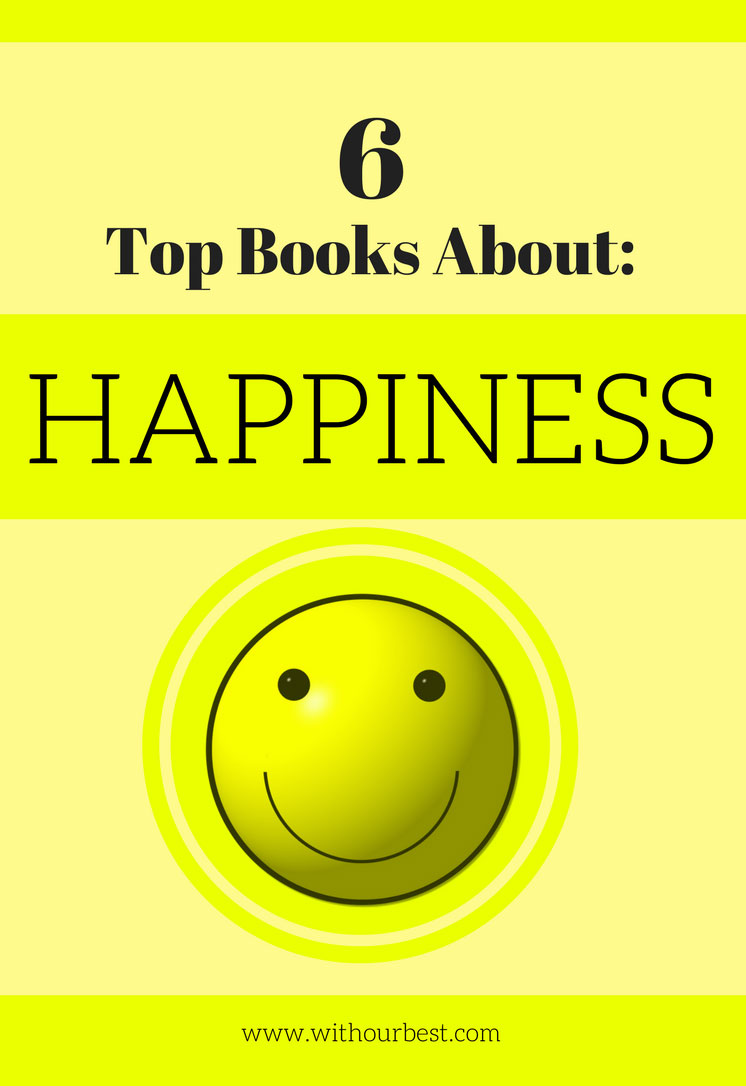
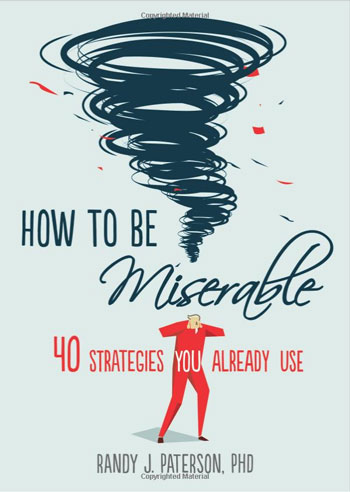 1) How to Be Miserable: 40 Strategies You Already Use Randy J. Paterson PhD
1) How to Be Miserable: 40 Strategies You Already Use Randy J. Paterson PhD
About the Book:
In How to Be Miserable, psychologist Randy Paterson outlines 40 specific behaviors and habits, which—if followed—are sure to lead to a lifetime of unhappiness. On the other hand, if you do the opposite, you may yet join the ranks of happy people everywhere!
This tongue-in-cheek guide will help you identify the behaviors that make you unhappy and discover how you—and only you—are holding yourself back from a life of contentment. You’ll learn to spot the tried-and-true traps that increase feelings of dissatisfaction, foster a lack of motivation, and detract from our quality of life—as well as ways to avoid them. Read more at New Harbinger…
My Thoughts:
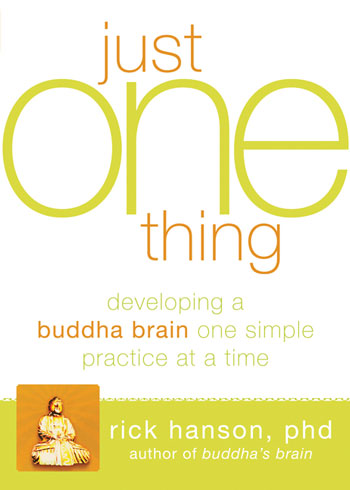 2) Just One Thing: Developing a Buddha Brain One Simple Practice at a Time Rick Hanson PhD
2) Just One Thing: Developing a Buddha Brain One Simple Practice at a Time Rick Hanson PhD
About the Book:
You’ve heard the expression, “It’s the little things that count.” It’s more than a simple platitude. Research has shown that integrating little daily practices into your life can actually change the way your brain works.
Moment to moment, whatever you’re aware of-sounds, sensations, thoughts, or your most heartfelt longings-is based on underlying neural activities. This book offers simple brain training practices you can do every day to protect against stress, lift your mood, and find greater emotional resilience.
Just one practice each day can help you to:
- Be good to yourself
- Enjoy life as it is
- Build on your strengths
- Be more effective at home and work
- Make peace with your emotions
With over fifty daily practices you can use anytime, anywhere, Just One Thing is a groundbreaking combination of mindfulness meditation and neuroscience that can help you deepen your sense of well-being and unconditional happiness. Read more at New Harbinger…
My Thoughts:
 3) The Unbelievable Happiness of What Is: Beyond Belief to Love, Fulfillment, and Spiritual Awakening Jon Bernie , Adyashanti
3) The Unbelievable Happiness of What Is: Beyond Belief to Love, Fulfillment, and Spiritual Awakening Jon Bernie , Adyashanti
About the Book:
We all want peace and freedom and love and happiness, we all want to be fulfilled, but so many of us fail to reach the level of contentment we’ve built up in our minds, often believing there’s something wrong with us and blaming ourselves, others, or circumstances for our perceived lack of accomplishment or satisfaction. But the truth is, happiness is not something you have to get or achieve, because it’s something you already have—in fact, it’s what you already are.
With this book, author Jon Bernie—counselor, healer, and teacher in the lineage of Adyashanti—sheds light on the struggle to find happiness, showing how our unexamined beliefs distort our identities and make us suffer by creating unconscious tension in our bodies and minds. You’ll learn how to bring awareness to these patterns and begin to unravel the tightly held, negative beliefs that have overshadowed your existence, finally moving through them and into a brightening of experience and the realization of true happiness, liberation, peace, and fulfillment. Read more at New Harbinger…
My Thoughts:
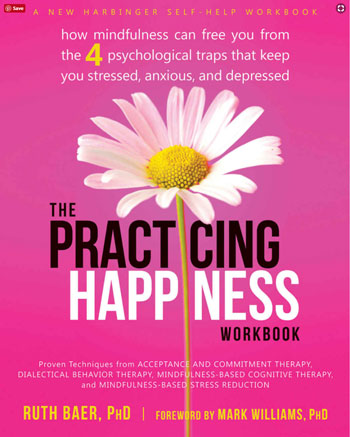 4) The Practicing Happiness Workbook: How Mindfulness Can Free You from the Four Psychological Traps That Keep You Stressed, Anxious, and Depressed Ruth Baer PhD, Mark Williams PhD
4) The Practicing Happiness Workbook: How Mindfulness Can Free You from the Four Psychological Traps That Keep You Stressed, Anxious, and Depressed Ruth Baer PhD, Mark Williams PhD
About the Book:
In this important and groundbreaking workbook, internationally-recognized mindfulness expert Ruth Baer discusses the four most common psychological traps that people get stuck in: rumination, avoidance, emotion-driven behavior, and self-criticism. To help you get past these traps, Baer provides powerful, proven-effective mindfulness strategies, exercises, and worksheets to guide you, step-by-step, to the life that you deserve.
“This book is like a mindfulness walk. It seamlessly integrates the best of mindfulness training from the major evidence-based care approaches, giving it a sense of breadth of vision, as if you can see across vast distances on your walk. It gently and calmly steps through many domains of self-exploration (rumination, emotion, self-criticism, values, and so on) and yet it never wanders. Each step is small, but each step is purposive, as if you are being guided on your walk by a very wise person who knows where she is going but is willing to let you set your own pace in getting there. And when you are done, you feel alive and whole, as if you have come home, and you are simply happy to be there. This is a walk worth taking-and a book worth reading. Highly recommended.” -Steven C. Hayes, PhD, foundation professor of psychology at the University of Nevada. Read more at New Harbinger…
My Thoughts:
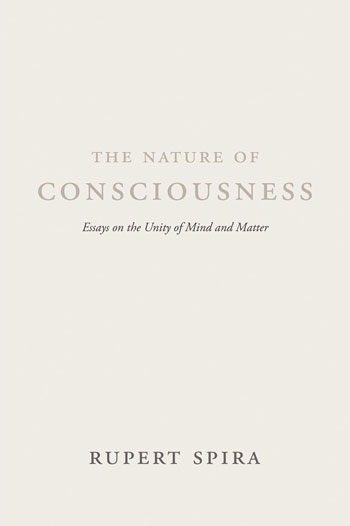 5) The Nature of Consciousness: Essays on the Unity of Mind and Matter Rupert Spira , Deepak Chopra MD, Bernardo Kastrup
5) The Nature of Consciousness: Essays on the Unity of Mind and Matter Rupert Spira , Deepak Chopra MD, Bernardo Kastrup
About the Book:
An exploration of the nature of consciousness has the power to reveal the peace and happiness that truly lie at the heart of experience. Our experience never ceases to change, but the knowing element in all experience—consciousness, or what we call “I”—itself never changes. The knowing with which all experience is known is always the same knowing. Being the common, unchanging element in all experience, consciousness does not share the qualities of any particular experience: it is not qualified, conditioned, or limited by experience. The knowing with which a feeling of loneliness or sorrow is known is the same knowing with which the thought of a friend, the sight of a sunset, or the taste of ice cream is known. Just as a screen is never disturbed by the action in a movie, so consciousness is never disturbed by experience; thus it is inherently peaceful. The peace that is inherent in us—indeed that is us—is not dependent on the situations or conditions we find ourselves in. Read more at New Harbinger…
My Thoughts:
 6) Feeling Better, Getting Better, Staying Better: Profound Self-Help Therapy for Your Emotions Albert Ellis PhD
6) Feeling Better, Getting Better, Staying Better: Profound Self-Help Therapy for Your Emotions Albert Ellis PhD
About the Book:
“Feeling better,” says Dr. Ellis, “is crucial to successful therapy. Getting better is even more important.” The most well-known and highly respected psychotherapist of our time offers a “three-pronged” system for maintaining — or regaining — emotional health.
“…easy to read, easy to understand, and easy to remember — the hallmarks of any good self-help volume. Readers who heed these cogent recommendations…are likely to find life more livable and decidedly more enjoyable.” —Arnold A. Lazarus, PhD, ABPP, Distinguished Professor Emeritus of Psychology, Rutgers University.
Feeling Better, Getting Better, Staying Better presents the author’s 50 years of psychotherapy experience and wisdom in a practical guide for the rest of us. Healthy thinking, healthy emotions, and healthy behavior are explained, with detailed examples and procedures for building lasting emotional well-being. Read more at New Harbinger…
